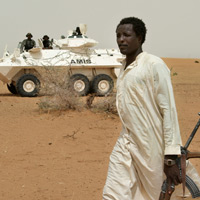
Ending the catastrophe in Darfur requires a 3 P strategy: protection for civilians, a peace agreement and punishment for human rights abuses. While the deployment of the UN-AU peacekeeping force is moving ahead in the face of constant obstruction by the Sudanese government and gross inattention by the international community, it will prove insufficient without a viable peace process.
Currently the Darfur peace process is in shambles
ENOUGH and the Save Darfur Coalition have outlined the urgent steps that must be taken to create a peace to keep in Darfur, using the model of the Comprehensive Peace Agreement (CPA) that ended the decades-long war in southern Sudan.
1. Appoint a single, empowered mediator
One strong lead mediator must replace the dual AU and UN special envoys because a diffusion of responsibility leads to a diffusion of effectiveness. The single mediator must have substantial negotiation
experience in Africa—preferably in Sudan—and must be supported by a full-time team.
2. Support the mediator with coordinated international leverage
A “Quartet” of countries with the most external leverage—China, France, the UK, and the US—must work together to support the peace process, and should consult closely with regional states such as Egypt, Libya, Chad, Ethiopia, Eritrea, Saudi Arabia, and South Africa.
The Quartet countries must dedicate full time staff in the region. In the case of the United States, Special Envoy Richard Wiliamson should have two full-time deputies working the Darfur and CPA issues as well as a field-based team with personnel in Khartoum, Chad and Juba.
“The time has come, finally, to get it right in Sudan. The long-suffering Sudanese people deserve as much.”
The UN Security Council—driven by the Quartet—must impose consequences in the form of targeted sanctions on key individuals, a comprehensive arms embargo, and additional support to the International Criminal Court (ICC).
3. Address the Darfur conflict in its local and national contexts
The peace process must address both the local and national issues that underlie the conflict, ensuring that resolution of the conflict in Darfur complements full implementation of the Comprehensive Peace Agreement that ended the conflict in southern Sudan and that provides a blueprint for the democratic transformation of the entire country. The peace process must be broadened to include traditional leaders and community leaders in camps for internally displaced personnel and refugees, Darfurian civil society groups, women’s organizations, political parties, and diaspora organizations such as the Darfur Leaders Network. This will create a sense of ownership among Darfurians.

